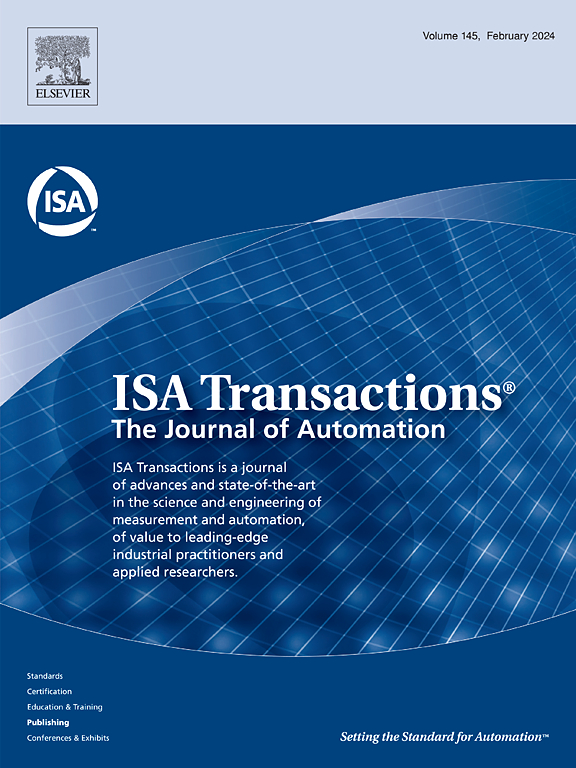Mode switching control of independent metering fluid power systems
IF 6.3
2区 计算机科学
Q1 AUTOMATION & CONTROL SYSTEMS
引用次数: 0
Abstract
An independent metering system (IMS) realizes the decoupling of the meter-in and meter-out orifices. The energy efficiency of the hydraulic system can be effectively improved by switching between different operational modes. However, the tracking accuracy of the IMS mode-switching system is difficult to ensure, which can easily lead to instability in the hydraulic system. In view of this, this paper proposes a mode switching controller based on an IMS. First, the K-filters theory is innovatively applied to the mode switching hydraulic system to estimate unmeasurable state variables of a system accurately. In addition, fuzzy logic systems (FLSs) are applied to handle the unmodeled errors and disturbances in the mechanical system dynamics model and hydraulic system. Further, aiming at the stability and trajectory tracking problems in the mode switching control (MSC) process of an IMS, the average dwell time (ADT) stability analysis method is applied to the mode switching hydraulic system to construct a set of switching rules to make the closed-loop switching system stable. Moreover, based on the prescribed performance control (PPC) theory, all state errors of a hydraulic system are guaranteed to reach the performance function constraint boundary at the specified time. Also, a dynamic surface control (DSC) technique is used to avoid the explosion of computational complexity caused by iterative differentiation inherent in the traditional backstepping method. Finally, the feasibility and effectiveness of the proposed method are verified by simulation, and experiments are carried out on mini-excavators. The results show that the designed controller can not only ensure the tracking accuracy, but also effectively suppress the instability of the hydraulic system caused by MSC.
独立计量流体动力系统模式切换控制。
一个独立的计量系统(IMS)实现了进出仪表孔的解耦。通过不同工作模式的切换,可以有效地提高液压系统的能效。然而,IMS模式切换系统的跟踪精度难以保证,容易导致液压系统不稳定。鉴于此,本文提出了一种基于IMS的模式切换控制器。首先,创新性地将k滤波器理论应用于换模液压系统中,对系统不可测状态变量进行准确估计。此外,应用模糊逻辑系统(FLSs)处理机械系统动力学模型和液压系统中的未建模误差和干扰。进一步,针对IMS模式切换控制(MSC)过程中的稳定性和轨迹跟踪问题,将平均停留时间(ADT)稳定性分析方法应用于模式切换液压系统,构建了一套切换规则,使闭环切换系统稳定。此外,基于规定性能控制理论,保证液压系统的所有状态误差在规定时间内达到性能函数约束边界。同时,采用动态曲面控制(DSC)技术,避免了传统反演方法中由于迭代微分而导致的计算复杂度爆炸。最后,通过仿真验证了所提方法的可行性和有效性,并在小型挖掘机上进行了实验。结果表明,所设计的控制器在保证跟踪精度的同时,还能有效地抑制由MSC引起的液压系统不稳定性。
本文章由计算机程序翻译,如有差异,请以英文原文为准。
求助全文
约1分钟内获得全文
求助全文
来源期刊

ISA transactions
工程技术-工程:综合
CiteScore
11.70
自引率
12.30%
发文量
824
审稿时长
4.4 months
期刊介绍:
ISA Transactions serves as a platform for showcasing advancements in measurement and automation, catering to both industrial practitioners and applied researchers. It covers a wide array of topics within measurement, including sensors, signal processing, data analysis, and fault detection, supported by techniques such as artificial intelligence and communication systems. Automation topics encompass control strategies, modelling, system reliability, and maintenance, alongside optimization and human-machine interaction. The journal targets research and development professionals in control systems, process instrumentation, and automation from academia and industry.
 求助内容:
求助内容: 应助结果提醒方式:
应助结果提醒方式:


